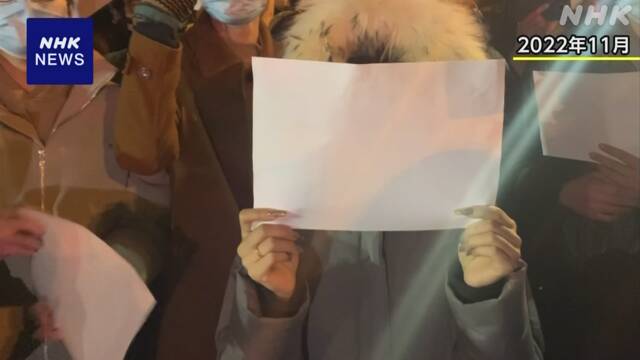It has been one year since the so-called "blank paper movement" in which young people protested by holding up white papers to protest against the backdrop of dissatisfaction with the "zero-COVID" policy of Chinese leader Xi Jinping. In China, amid widespread uncertainty about the economic outlook, the authorities are wary of turning people's discontent into criticism of the regime and are stepping up surveillance.
In China, in November last year, protests against the "zero-COVID" policy, which involves strict restrictions on movement, spread to various places, and in Shanghai, one year ago, on the 11th and 1th, there was an unusual situation in which people openly criticized the regime by saying, "Xi Jinping must resign."
These protests spread throughout the capital, Beijing, and other places, and are also called the "blank paper movement" because young people who participated in the protest held up white papers to express their protest without saying a word.
Since then, the Xi Jinping leadership has abruptly ended the "zero-COVID" policy, and there have been no more overt protests.
However, in China, the economic recovery has been lacking strength even after the end of the "zero-COVID" policy, the employment situation is severe, especially among young people, and the real estate recession is becoming more serious, and the economic outlook is uncertain.
Under these circumstances, the authorities are wary that people's dissatisfaction will turn to criticism of the system, and are strengthening surveillance, such as managing accounts on social networking sites that transmit social issues.
The young people who participated in the protests last year were:
During the protests that spread across China in November last year, young people who participated in the protests were detained by the authorities one after another.
Among them, a man in his 11s who was detained in Shanghai and later moved overseas gave an interview to NHK online.
The man was detained at the scene of a protest in Shanghai in the early morning of November 20 last year, and was subsequently interrogated at a police station, where he was assaulted by police officers.
In addition to the experience of being detained, the man moved abroad in October because he was frustrated with the lack of freedom of speech, such as being monitored for his speech on the Internet.
Currently, I am applying for refugee status in the country where I have moved, so I am living while moving from place to place.
The man said of the protests one year ago, "I think that if more people, not just students and young people, participated, it would have had the effect of promoting democracy in China," and said, "The protests may happen again, but the government does not want to be known outside the country and is increasing surveillance, so the police will suppress it." He said the authorities are increasing their vigilance.
And about the attitude of the authorities who do not mention the protests, "The government does not take the initiative to mention it, as well as historical events such as the 'Tiananmen Square incident', and hides or deceives.

